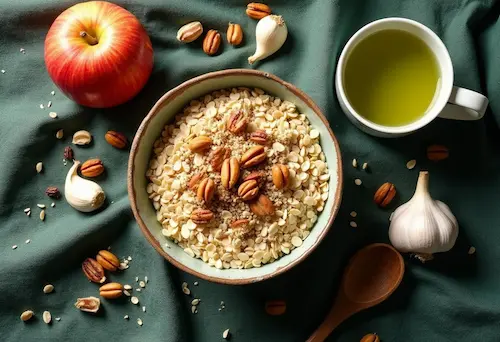Exploring natural remedies to lower cholesterol is a proactive and empowering way to take charge of your heart health and work in partnership with your doctor. It’s late in Pune, and if a recent blood test report has left you feeling worried about your cholesterol numbers, you’re in the right place to find clear, actionable, and hope-filled steps you can take, starting tomorrow.
A high cholesterol diagnosis can be unsettling, often bringing with it fears about heart disease and a feeling that your health is no longer in your control. But the power to positively influence your cholesterol levels is, to a large extent, on your plate and in your daily habits.
This detailed guide is about those powerful, natural choices. It’s about how simple, consistent changes to your diet and lifestyle can make a profound difference.
A Crucial Disclaimer: High cholesterol is a serious medical condition. The information and remedies discussed here are intended to support a healthy lifestyle and should be used in conjunction with your doctor’s advice. They are not a replacement for any prescribed medication or a professional medical plan.
Table of Contents
Understanding Your Cholesterol Report: The ‘Good’ vs. The ‘Bad’
Before we dive into the remedies, let’s quickly demystify your report. Cholesterol is a waxy substance that’s essential for building healthy cells, but too much of the wrong kind is a problem.1 Think of it this way:
- LDL (Low-Density Lipoprotein): This is the “bad” or “lousy” cholesterol.2 Imagine it as a delivery truck that can sometimes drop its cargo (plaque) in your arteries, causing them to narrow and harden. You want this number to be low.
- HDL (High-Density Lipoprotein): This is the “good” or “helpful” cholesterol.3 Think of it as the “garbage truck” that goes around collecting excess cholesterol from your arteries and taking it back to the liver to be removed. You want this number to be high.
Our goal is not just to lower cholesterol, but to achieve a healthy balance between the two.
5 Detailed Natural Remedies to Lower Cholesterol
Here are five areas to focus on, with detailed explanations and practical tips for an Indian lifestyle.
1. Increase Your Soluble Fibre Intake (The ‘Cholesterol Sponge’)4
In Detail: Soluble fibre is a type of fibre that dissolves in water to form a gel-like substance in your digestive tract.5 This “gel” is a true superhero. It acts like a sponge, binding to cholesterol and bile acids (which are made from cholesterol) in your intestines and escorting them out of your body before they can be absorbed into your bloodstream. This is one of the most effective natural remedies to lower cholesterol.
- Indian Food Sources:
- Oats and Barley (Jau): Start your day with a bowl of oatmeal or barley porridge.
- Lentils and Legumes: A daily bowl of dal, chana, or rajma is a fantastic source of soluble fibre.6
- Vegetables: Bhindi (okra), carrots, sweet potatoes, and brinjals are particularly rich in soluble fibre.
- Fruits: Apples, guavas, oranges, and pears are excellent choices.
2. Embrace Healthy Fats, Ditch the Bad Ones (The ‘Oil Change’)
In Detail: Not all fats are created equal. Saturated fats (found in fatty meats, butter, ghee, coconut oil) and especially trans fats (found in fried and packaged foods) can raise your “bad” LDL cholesterol.7 Conversely, unsaturated fats (monounsaturated and polyunsaturated) can help lower LDL and raise “good” HDL cholesterol.8
- Healthy Fats to Include:
- Nuts and Seeds: Snack on a handful of almonds (badam) and walnuts (akhrot), which are rich in heart-healthy fats. Add flaxseeds (alsi) to your yogurt or roti dough.
- Oils: Use oils like mustard oil, groundnut oil, or olive oil for cooking in moderation.
- Fats to Limit:
- Reduce your intake of ghee, butter, and palm oil.9
- Drastically cut down on deep-fried foods like samosas, pakoras, and bhajis, as well as packaged biscuits and chips which often contain unhealthy trans fats.
3. Harness the Power of Specific Spices and Herbs (The ‘Kitchen Pharmacy’)
Your Indian spice box is a treasure trove of medicinal compounds that can help manage cholesterol.
In Detail:
- Garlic (Lasan): Contains a compound called allicin, which has been shown to interfere with cholesterol production in the liver. Try to include 1-2 cloves of fresh garlic in your daily cooking.
- Fenugreek (Methi)10 Seeds: Rich in fibres and compounds called steroidal saponins, which help to reduce the body’s absorption of cholesterol from the intestines. Soaking a teaspoon of methi seeds overnight and drinking the water is a traditional remedy.
- Coriander (Dhania) Seeds: A traditional Ayurvedic remedy, water from boiled coriander seeds is believed to be a diuretic that helps the kidneys flush out excess cholesterol.11
- Amla (Indian Gooseberry): This Vitamin C powerhouse is also a potent antioxidant that helps to prevent the oxidation of LDL cholesterol (a key step in plaque formation) and can help lower overall levels.
4. Get Moving: The Power of Regular Exercise
In Detail: Physical activity is one of the most effective ways to change your cholesterol profile for the better.12 While diet primarily helps to lower “bad” LDL, aerobic exercise is a champion at raising your “good,” protective HDL cholesterol.13 Exercise also helps you maintain a healthy weight, which is crucial for heart health.
- What to Do: Aim for at least 30-45 minutes of moderate-intensity aerobic exercise most days of the week. This doesn’t have to be in a gym.
- A brisk walk is one of the best and most accessible forms of exercise.14
- Cycling, swimming, or even dancing are excellent options.15
- Dynamic yoga sequences like Sun Salutations (Surya Namaskar) can provide a great cardiovascular workout.
5. Manage Stress Mindfully
In Detail: While stress doesn’t directly contain cholesterol, chronic stress can lead to behaviours that do (like eating unhealthy comfort foods). Furthermore, high levels of the stress hormone cortisol over long periods have been linked to higher blood cholesterol levels.
- What to Do: Incorporate stress-management techniques into your daily routine.
- Pranayama: Simple breathing exercises like Anulom Vilom (alternate nostril breathing) for 10 minutes a day can significantly calm the nervous system.
- Meditation: A daily meditation practice can help lower stress and improve your overall sense of well-being.
- Sleep: Ensure you get 7-8 hours of quality sleep per night, as poor sleep contributes to stress and can negatively impact cholesterol levels.
Conclusion: A Holistic Path to a Healthy Heart
Managing your cholesterol is not about a single “magic” food or remedy. It is a holistic journey. The path to a healthy heart is paved with the small, mindful choices you make every single day.
By embracing these natural remedies to lower cholesterol, you are not just managing numbers on a report; you are actively nourishing your body, respecting your heart, and investing in a long, healthy, and vibrant life. Start with one small change today. Your heart will thank you for it.
What is one healthy swap you can make in your diet starting tomorrow to support your heart health? Share your commitment with our supportive community in the comments below!




